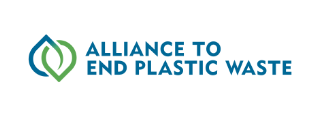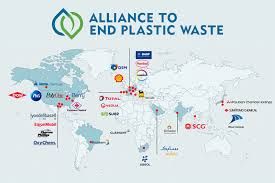Industry alliance sets out $1bn to tackle oceans' plastic waste
Published on by Water Guardian Research in Technology
Greenpeace sceptical about corporate polluters as alliance launched to reduce waste

The scourge of plastic waste in the world’s oceans is the target of a new global alliance of businesses which says it will try to reduce the amount of plastic waste produced and improve recycling.
The Alliance to End Plastic Waste, launched on Wednesday, includes companies producing consumer goods and plastic, as well as waste management and recycling firms. Among more than 25 companies joining the effort are household names such as Procter & Gamble, Shell, BASF and ExxonMobil.
 Together the companies have committed $1bn (£778m) over the next five years, with an aspiration to raise that to $1.5bn (£1.2bn) if further members join.
Together the companies have committed $1bn (£778m) over the next five years, with an aspiration to raise that to $1.5bn (£1.2bn) if further members join.
The firms intend to invest in a wide variety of projects, including research and development into new recycling technologies, building infrastructure to collect and recycle waste, and cleaning of areas where plastic waste concentrates, such as in rivers.
About 8m tonnes of plastic waste is dumped in the seas annually, according to the UN. Plastic in the seas can choke fish and other marine creatures, destroy habitats and enter the food chain. But despite increasing public awareness about the problem, highlighted by Sir David Attenborough’s Blue Planet II programmes, there has been little sign of it abating.
David Taylor, chief executive of Procter & Gamble, who will chair the alliance, said industries involved in plastic production, use and recycling, had the ability to make a substantial difference to the amount of plastic waste polluting the oceans if they combined their efforts.
“We believe in the power of collective action,” he said. “We want to minimise the use of plastic, make it recyclable, and start to generate a circular economy. Plastic has value, and we want to work to recapture that value time and time again. What is different about [the alliance] is that it is collective action, across the value chain.”
He said P&G, which makes scores of household products, from Pampers disposable nappies and Ariel washing powder, to Gillette razors and Olay cosmetics, had been working for years to minimise its use of plastic and investigate alternatives, but that by combining with other companies it could do more. “We want to scale this up,” he said.
However, some campaigners were not impressed. Graham Forbes, global plastics project leader at Greenpeace, said: “This is a desperate attempt from corporate polluters to maintain the status quo on plastics. In 2018 people all over the world spoke up and rejected the single-use plastics that companies like Procter & Gamble churn out on a daily basis, urging the industry to invest in refill and reuse systems and innovation. Instead of answering that call, P&G preferred to double down on a failed approach with fossil fuel giants Exxon, Dow and Total [which] fuel destructive climate change.”He added: “Make no mistake, plastics are a lifeline for the dying fossil fuel industry, and this announcement goes to show how far companies will go to preserve it.”
Rob Kaplan, chief executive of Circulate Capital, which invests in recycling and other projects to reduce plastic waste, said businesses would provide the answer to plastic waste, but it would take many billions in investment. “There is no silver bullet to the plastic problem. Different parties are trying to push their own agenda, but there does not seem to be an alternative at present,” he said.
Recycling, along with minimising waste, would be critical to removing the problem, he added, but the infrastructure to allow for widespread recycling was still lacking across much of the world, even in many developed countries.
Source: The Guardian
For more information on The Alliance to End Plastic Waste : https://endplasticwaste.org/
Media
Taxonomy
- microplastics
- Single-use plastic